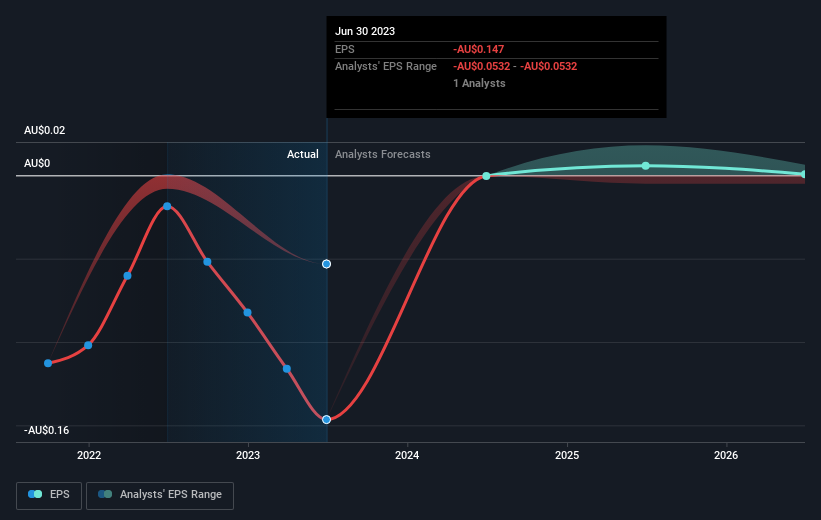Bubs Australia Limited's (ASX:BUB) Shift From Loss To Profit
With the business potentially at an important milestone, we thought we'd take a closer look at Bubs Australia Limited's (ASX:BUB) future prospects. Bubs Australia Limited, together with its subsidiaries, engages in the production and sale of various infant nutrition products in Australia, China, the United States, and internationally. On 30 June 2023, the AU$120m market-cap company posted a loss of AU$108m for its most recent financial year. Many investors are wondering about the rate at which Bubs Australia will turn a profit, with the big question being “when will the company breakeven?” We've put together a brief outline of industry analyst expectations for the company, its year of breakeven and its implied growth rate.
Check out our latest analysis for Bubs Australia
Consensus from 3 of the Australian Food analysts is that Bubs Australia is on the verge of breakeven. They anticipate the company to incur a final loss in 2024, before generating positive profits of AU$2.8m in 2025. So, the company is predicted to breakeven approximately 2 years from today. How fast will the company have to grow each year in order to reach the breakeven point by 2025? Working backwards from analyst estimates, it turns out that they expect the company to grow 126% year-on-year, on average, which is rather optimistic! Should the business grow at a slower rate, it will become profitable at a later date than expected.
Given this is a high-level overview, we won’t go into details of Bubs Australia's upcoming projects, but, bear in mind that typically a high growth rate is not out of the ordinary, particularly when a company is in a period of investment.
Before we wrap up, there’s one aspect worth mentioning. The company has managed its capital judiciously, with debt making up 4.8% of equity. This means that it has predominantly funded its operations from equity capital, and its low debt obligation reduces the risk around investing in the loss-making company.
Next Steps:
This article is not intended to be a comprehensive analysis on Bubs Australia, so if you are interested in understanding the company at a deeper level, take a look at Bubs Australia's company page on Simply Wall St. We've also put together a list of pertinent aspects you should further research:
Historical Track Record: What has Bubs Australia's performance been like over the past? Go into more detail in the past track record analysis and take a look at the free visual representations of our analysis for more clarity.
Management Team: An experienced management team on the helm increases our confidence in the business – take a look at who sits on Bubs Australia's board and the CEO’s background.
Other High-Performing Stocks: Are there other stocks that provide better prospects with proven track records? Explore our free list of these great stocks here.
Have feedback on this article? Concerned about the content? Get in touch with us directly. Alternatively, email editorial-team (at) simplywallst.com.
This article by Simply Wall St is general in nature. We provide commentary based on historical data and analyst forecasts only using an unbiased methodology and our articles are not intended to be financial advice. It does not constitute a recommendation to buy or sell any stock, and does not take account of your objectives, or your financial situation. We aim to bring you long-term focused analysis driven by fundamental data. Note that our analysis may not factor in the latest price-sensitive company announcements or qualitative material. Simply Wall St has no position in any stocks mentioned.

 Yahoo Finance
Yahoo Finance 
